- Home
- Walter Moers
The City of Dreaming Books Page 14
The City of Dreaming Books Read online
Page 14
‘I myself have no idea how many there are,’ said Smyke, as if he had read my thoughts, ‘- no idea whatsoever. I only know they all belong to me under the terms of the Bookholmian Constitution.’
‘Is this a genuine dripstone cave,’ I asked, ‘or was it hewn out of the rock?’
‘Most of it originated naturally, I believe. Everything here must once have been under water. That’s indicated by the fossils embedded in the rock - for which any Zamonian biologist would give his right hand.’ Smyke chuckled. ‘But all the surfaces look polished, hence the artificial impression. I surmise that some industrious souls gave nature a helping hand - more than that I can’t say.’
‘And all these books belong to you?’ I said stupidly. The idea that such an immense collection could belong to one person struck me as absurd.
‘Yes. I inherited them.’
‘You mean they’re a family heirloom? An heirloom handed down by your - forgive me for citing your own description - degenerate ancestors? They must have been remarkably cultivated and refined for all that.’
‘Oh, please don’t think that refinement and degeneracy are mutually exclusive.’ Smyke heaved a sigh. He took a book from a shelf and regarded it meditatively.
‘I should point out that none of this belonged to me at birth,’ he went on. ‘I grew up in Grailsund, a long way from Bookholm. The business I engaged in there had absolutely no connection with books. It didn’t go too well, either, so one day I found myself in dire financial straits. Don’t worry, though, I won’t bore you with the story of my youthful poverty. I’m just coming to the nice part.’
Smyke replaced the book. My eyes strayed over the incredible subterranean scenery. Some white bats were fluttering among the stalactites high overhead.
‘One day I received a letter from a Bookholm solicitor,’ Smyke continued. ‘I had very little desire to visit this musty old city of books, to be honest, but the letter informed me that I had come into an inheritance, and if I didn’t take it up in person it would pass to the municipality. Although it didn’t say what the inheritance comprised or what it was worth, I would at that time have welcomed ownership of a public convenience, so I set off for Bookholm. It transpired that my inheritance - the estate of my great-uncle Hagob Salbandian - consisted of the small house that is now some two thousand feet above our heads.’
Two thousand feet of soil and rock between us and the surface? It wasn’t a particularly pleasant thought.
‘I took up my inheritance with a touch of disappointment, of course, because I’d travelled to Bookholm filled with visions of a considerably more sensational bequest. For all that, a house of my own - a listed building on which I wouldn’t have to pay rent - was an improvement on my existing circumstances. As a citizen of Bookholm I was entitled to study at the local university. Since it was obvious how to make money in this city, I enrolled in the courses on Zamonian literature, antiquarianism and typography. I also did a wide variety of menial jobs ranging from book-walking to scissor-washing. A person with fourteen hands can always find work.’
Smyke looked down at his numerous hands and sighed.
‘One night, while combing my cellar for something worth selling, I found that its only contents were empty bookcases. Well, bookcases are always in demand in Bookholm, so I thought I’d take one upstairs, spruce it up a little and sell it. When I tried to wrench it off the wall - well, you saw what happened just now: the secret door swung open, revealing the route to Hagob Salbandian’s real bequest.’
‘Did your uncle collect all these books?’
‘Hagob? Certainly not. From what I know of him, he wasn’t entirely sane. He used to make those sculptures I mentioned - sculptures carved out of hairs under a microscope with tools of his own invention. He was known throughout the city as a crack-brained eccentric who begged food from bakers and innkeepers. Can you imagine it? There he was, sitting on this immense fortune but engraving scenes from Zamonian history on horsehairs and eating stale loaves and kitchen waste. They didn’t even find his body, just his will.’
What a story, dear readers! The last will and testament of a lunatic. The most valuable library in Zamonia far below ground. This was material that cried out to be converted into literature. The outlines of a novel took shape in my mind within seconds. My first promising idea for ages!
Smyke hauled himself up an iron handrail and looked down into a deep chasm whose walls were lined with bookshelves.
‘The owner of a house that gives access to a subterranean book cave automatically owns the cave and its contents. That rule has applied for hundreds of years, and this is the biggest cave containing the biggest collection of antiquarian books in the whole of Bookholm. It has belonged to the Smyke family from time immemorial.’
He was still staring into the depths.
‘Well, it would be fantastic enough if these books were of average quality, but they’re all literary gems: first editions, long-lost libraries, books whose existence has been in doubt for a thousand years. Many a Bookholm antiquarian would be happy to possess even one volume equal in quality to those in my collection. This isn’t just the biggest library in Bookholm, it’s the city’s greatest treasure. Several items on the Golden List are here.’
‘Aren’t you afraid someone will break in? All that stands in the way is your little house and that ridiculous lock.’
‘No, no one will break in. It’s impossible.’
‘Ah, so you’ve installed some traps!’
‘No, no traps. This cave is entirely unprotected.’
‘Isn’t that a bit . . . risky?’
‘No. And now I’ll let you into a secret: no one will break into this cave because no one knows of its existence.’
‘I don’t understand. You told me the Smykes have owned it from time immemorial.’
‘Quite so, and they carefully obliterated all trace and recollection of it over the centuries. They bribed local officials, removed entries from the land register, forged historical works and maps. They’re also said to have eliminated one or two people.’
‘Good heavens! How do you know?’
‘There are countless family papers down here - diaries, letters, documents of all kinds. You wouldn’t believe what depths of infamy they reveal. I’m not too proud of my ancestry, as I already told you.’ Smyke fixed me with an earnest gaze.
‘To all intents and purposes,’ he went on, ‘this cave doesn’t exist. It’s known only to me and a few very close associates of mine - people I trust implicitly. Colophonius Regenschein too, of course. And now you.’
I was speechless for a moment.
‘What made you confide in me, of all people? A total stranger?’
‘I’ll explain in due course - it’s partly to do with your manuscript - but first let me come to the really interesting part of my story.’
‘You mean there’s an even more interesting part?’ I couldn’t help laughing.
Smyke let go of the handrail and grinned at me. ‘You know, people in the city still regard me as dealer with a specialised stock, a fortunate heir and parvenu with a nose for valuable books and excellent connections with collectors and Bookhunters - one who never keeps more than a crate of books on his premises.’
He suddenly assumed an expression I couldn’t interpret.
‘But down here I’m a different person. See that bookcase over there, the one filled with first editions from the fourth century? Each of them would buy me a whole urban district, or bribe a politician for life, or get a mayor elected by financing his campaign. I don’t do any of those things, of course.’
‘Of course not,’ I said. I had no idea what he was driving at and hoped he would soon get round to my manuscript.
‘No, of course I don’t. I get my underlings to do them for me.’
What was he talking about? I was starting to feel uneasy.
Smyke looked at me intently. ‘I don’t buy books, I buy whole bookshops. I sell vast consignments of books. I flood the market wit
h cheap offers, ruin my competitors and, when they go broke, buy up their businesses for peanuts. I control rentals throughout the city. I own most of the publishing houses and nearly all the paper mills and printing works. All of Bookholm’s Master Readers are on my payroll, as are all the residents of Poison Alley. I dictate the price of paper and the size of editions. I determine which books succeed and which don’t. I make successful authors and destroy them at will. I’m the ruler of Bookholm. I’m Zamonian literature personified.’
Was this a joke? Was this literary scholar submitting me to a test of some kind? Was he giving me a sample of his curious sense of humour?
‘And this is just the start. I shall extend my network of antiquarian bookshops from Bookholm to the whole of Zamonia. I’ve already opened branches in Grailsund, Florinth and Atlantis, and they’re all doing splendidly, take it from me. One day in the not too distant future I shall control Zamonia’s entire book trade and property market, and from there it’s only a short step to political dictatorship. I think on a grand scale, as you see.’
‘You’re joking,’ I said in dismay.
‘Not at all. Better take me seriously, because I can assure you of one thing: it’s going to be far from funny for people of your kind when I come to power.’ Smyke’s voice had taken on an edge that made me shiver.
‘People of my kind?’ I said.
‘Artists!’ cried Smyke. He uttered the word as if it meant ‘Rats!’
‘Artists will come off worst under my regime, I fear, because I shall abolish literature. And music, and painting, and theatre, and dance - all the arts, the whole decadent, redundant caboodle! I shall have every book in Zamonia burnt, every canvas stripped of paint with acid, every sculpture smashed, every sheet of music torn up. I shall erect bonfires out of musical instruments. Violin strings will be knotted into hangmen’s nooses. Then peace will prevail - cosmic peace and good order. We shall be able to breathe freely at last and venture upon a new beginning unencumbered by the scourge of art. It will be a world in which reality alone exists.’
Smyke heaved a voluptuous sigh.
If he wasn’t joking, I told myself, he could only be rehearsing for a stage play. Either that, or he’d been smitten with some grave mental disorder. It seemed to run in the family, after all. Hagob Salbandian’s eyes, too, had blazed with insanity.
‘Can you imagine how lucid our thoughts will be once we’ve liberated them from the arts?’ Smyke demanded. ‘Once we’ve swept our soiled brains clean of senseless dross? Can you imagine how much more time we’ll be able to spend on the things that really matter in life? No, of course you can’t. You’re an author.’
He positively spat the word in my face.
‘It won’t be possible to eliminate the arts without eliminating their exponents. I shall regret that, because many of my acquaintances are artists, and some of them are really nice people - friends, even. However, one has to observe certain priorities.’
Smyke’s face hardened.
‘Yes, friends will have to die. Doubtless you’re wondering why I’m prepared to shoulder such a burden of guilt. Don’t I suffer from pangs of conscience? The short answer is: “No!” In my position I simply can’t afford pangs of conscience. Fortunately, they fade the more power one acquires. It’s an entirely natural process.’
I’d had enough.
‘I’d like to go now,’ I said. ‘Please could you give me back my manuscript?’
Smyke acted as if he hadn’t heard the question.
‘The only form of art I shall continue to permit is trombophone music. That’s because it’s a science, not an art at all. You probably suppose that what you heard last night was music. Allow me to correct you: it was acoustic alchemy, hypnosis by means of sound waves. Music is the least resistible of all the arts, so I simply had to make use of it. Try getting an audience to dance by reciting a poem! Try getting them to march! Impossible! Only music can do that. I discovered Doremius Fasolati’s scores down here, the Optometric Rondos, and recognised their potential at once. Their circular arrangement made sense to me even before I’d read a single note. Everything goes round in circles, my friend! With the aid of the Murkholm Trombophone Orchestra I’ve succeeded in converting music into power, notes into commands, instruments into weapons, concertgoers into slaves! You thought you were listening to music, but it was really a series of posthypnotic commands. Yesterday I induced you to buy books, tomorrow I may get you to burn the city to the ground. If I’d instructed you to eat one another you’d have done so with relish.’
Unpleasant though the situation was, I didn’t feel threatened. I was physically more than a match for a Shark Grub and I knew the way back.
‘Now would you please return my manuscript?’ I asked again, as politely and firmly as I could. If he didn’t comply I would simply leave and turn his house upside down until I found it.
‘Oh, do forgive me,’ said Smyke, every inch the kindly host once more. ‘The manuscript! I’m afraid my tongue ran away with me.’
He leant towards me and spoke in a conspiratorial tone. ‘I’m sure you’ll treat my confidences with discretion, won’t you? I wouldn’t like any of them to become public knowledge.’
He was a screw loose, that was beyond doubt. I nodded to be on the safe side.
‘Of course, the manuscript,’ he said, undulating over to a bookcase. ‘That’s why we’re here, after all. But first I must show you something.’
He reached into the bookcase and removed a black book with the ominous Triadic Circle blocked in gold on the cover.
‘It’s an immensely old book, so I had to have it rebound. I designed the Triadic Circle myself. What do you think of it?’
I didn’t reply.
‘It symbolises the three components of power: power, power and power.’ He laughed and handed me the book.
‘What am I supposed to do with it?’ I asked.
‘You have three questions for me. First you’d like to know why I’m telling you all these things, right? Secondly, you’re wondering what they’ve got to do with your manuscript. And, thirdly, you’d like to know if what I’ve told you is true. All good things come in threes, don’t they? You’ll find the answer to all three questions in this book bearing the Triadic Circle. On page 333, of course.’
I was loath to open the book.
‘How can the answer to today’s questions be in such an old book?’
‘The answers to almost all of today’s questions can be found in old books,’ Smyke retorted. ‘If you want to find out, look them up. If not, forget it.’
Was this another manifestation of his mental illness? It was thoroughly symptomatic of such cases to cherish a belief in hidden textual signs and commands, numerology and disembodied voices. That would fit. But why in the world shouldn’t I simply look up the page? At least that would enable me to satisfy myself that I really was dealing with a lunatic. If the text on page 333 had no bearing on our present situation, my diagnosis would be correct. Then all that remained for me to do would be to get out fast and hope the condition wasn’t catching.
I opened the book at random. Page 123. It was blank except for the page number. I looked at Smyke. He was smiling.
I turned over some more pages.
Page 245. No text, no illustration. The opposite page was just as blank.
Page 299. Blank.
‘There’s nothing there at all,’ I said.
‘You’re looking in the wrong place,’ Smyke replied, raising three fingers. ‘Try page 333.’
I went on turning.
Page 312. Blank.
Page 330. Blank.
Page 333. I was there at last. This time the page really did bear some text in very small type. Resting my paw on the paper, I screwed up my eyes and peered more closely. My fingertips felt strangely cold. Printed on this page and the one facing it was the same short sentence repeated ad infinitum:
The cold sensation in my fingertips travelled up my arm and permeated my body. My head sw
am, my eyes went dim and I heard Smyke say: ‘You really are one of those dreamers who believe that the answer to any question can be found in a book, aren’t you? But the printed word isn’t always good or helpful, it can even be thoroughly malign. Haven’t you ever heard of the Hazardous Books? Many of them kill at the slightest touch.’
Then everything went black.
Part Two
The Catacombs of Bookholm
A place accurséd and forlorn
with walls of books piled high,
its windows stare like sightless eyes
and through them phantoms fly.
Of leather and of paper built,
worm-eaten through and through,
the castle known as Shadowhall
brings every nightmare true.
The Living Corpse
I had been poisoned, dear readers - poisoned by contact with the envenomed pages of an ancient tome. Now you’ll understand what I meant when I said that books are capable of harming and even killing people. I had fallen prey to one of the so-called Hazardous Books.
The poison acted quickly, very quickly. Scarcely had my fingertips touched the pages when an icy sensation surged through my body, a wave of cold that permeated my bloodstream, invading every nerve and freezing every cell until I went numb all over and even my eyesight failed.
You’ve just been poisoned . . .
Those words were all that remained. In utter darkness, I was bereft of everything save that interminably repeated thought:
You’ve just been poisoned, you’ve just been poisoned, you’ve just been poisoned, you’ve just been poisoned, you’ve just been poisoned . . .
Do you know those frightful dreams in which you’re imprisoned in an endless cycle that compels you to dream the same thing over and over again? That’s how it was with me.

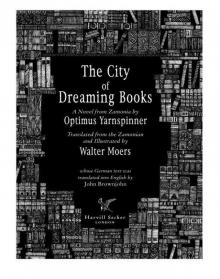 The City of Dreaming Books
The City of Dreaming Books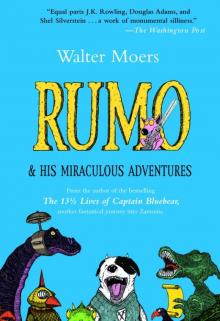 Rumo: And His Miraculous Adventures
Rumo: And His Miraculous Adventures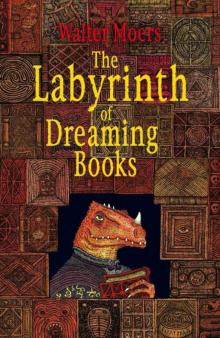 The Labyrinth of Dreaming Books
The Labyrinth of Dreaming Books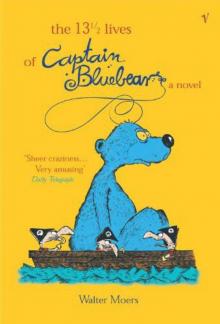 The 13.5 Lives of Captain Bluebear
The 13.5 Lives of Captain Bluebear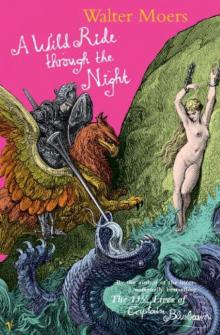 A Wild Ride Through the Night
A Wild Ride Through the Night